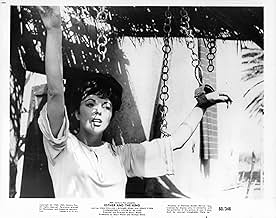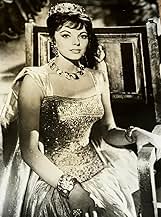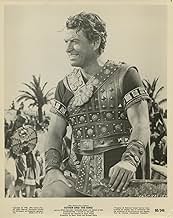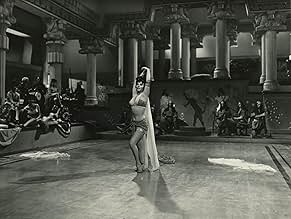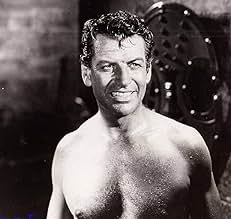Adicionar um enredo no seu idiomaTwo decades before she would gain fame and some fortune as Alexis Carrington on Dynasty (1981), Dame Joan Collins starred as Esther in this melodramatic, routine Biblical story. The setting ... Ler tudoTwo decades before she would gain fame and some fortune as Alexis Carrington on Dynasty (1981), Dame Joan Collins starred as Esther in this melodramatic, routine Biblical story. The setting is Persia in the fourth century B.C., as Esther comes to the attention of the recently wid... Ler tudoTwo decades before she would gain fame and some fortune as Alexis Carrington on Dynasty (1981), Dame Joan Collins starred as Esther in this melodramatic, routine Biblical story. The setting is Persia in the fourth century B.C., as Esther comes to the attention of the recently widowed King Ahasuerus. The King has been trying to stifle and defeat the campaign of hatred ... Ler tudo
- Direção
- Roteiristas
- Artistas
- Simon
- (as Rick Battaglia)
- Hegai
- (as Robert Buchanan)
- Jewish Man
- (não creditado)
- Gladiator
- (não creditado)
- Soldier
- (não creditado)
- Bald Gladiator
- (não creditado)
- Jewish Fighter
- (não creditado)
- Villager
- (não creditado)
- Villager
- (não creditado)
- …
- Direção
- Roteiristas
- Elenco e equipe completos
- Produção, bilheteria e muito mais no IMDbPro
Avaliações em destaque
The part of Simon-played by Ric(k) Battaglia ,a specialist of the cheap Italian sword and sandal ,who played such figures as Orlando(Roland) or Vercingetorix- was made from start to finish by the screenwriters ,to create a dilemma for the heroine.The Bible,anyway,is given a rough ride :nothing is told ,for example ,about the fact that Mordecai -not Esther's uncle ,but actually her cousin,which does not make a big difference anyway- did not want to make a deep bow to Haman.
Richard Egan ,on the other hand, is a good king ,he has style ,and he is as convincing a monarch as he is the good doctor,Pollyanna's friend ,the same year.
The music, written by the Italian master Francesco Lavagnino, one of the great movie music composers of the 20th century, commands the mood of each scene and spans the range of moods in the work, from the march of soldiers to the Queen in the flower garden to her love scene with the King to the mystic mood in the ruins where Simon hides. It is a fine piece of composition.
The words in the script are, in some scenes, not meant to be ordinary conversation, but rather noble thoughts, royal council, and human aspirations, and thus are written and delivered as such. When mental burdens weigh heavily on the King, he is told by his friend Mordecai that "... by lifting the burdens of others one can lift one's own burden ... " Such thoughts are actually quite profound, that in some cases depressed moods arise from self-centered thinking and self-victimization, and that by helping others in a selfless way one can relieve one's own burdens. In the garden, Mordecai councils Esther that " .. the King is attracted to her sense of justice and loyalty, the same qualities that bind her still to Simon, her previous love, and that may turn the King against her in jealousy..."
The cinematography in the scene of the death of Simon, where the camera rises above Simon and the queen to the Star of David, which then appears on the wall of the next scene, is very well done. In another scene, the King is asked whom he had chosen to be his queen, and as he replies "A girl named Esther", the camera pans past the concerned face of Haman to reveal the quite different satisfied expression of Mordecai.
There is much to appreciate in the music, words, and visual presentation of this work. Of course this is not meant to be a documentary, a faithful retelling of an ancient story. Criticism should be directed at how it fails in its own intent as a melancholic, romantic, and introspective fantasy, rather than based on the viewer's expectations. If my understanding of its intent is near the mark, then my conclusion is that this work, like the Raoul Walsh epic The Big Trail made 30 years earlier, succeeds very well.
Like a number of other bargain-basement epics ("Samson and Delilah", "Salome" and "Solomon and Sheba" all come to mind), "Esther" is an odd mixture of godliness and sexiness. Films of this nature generally preached a vaguely Christian message (in this case that religious toleration is preferable to sectarian genocide) but in order to get that message across the producers seemed to find it necessary to show as much female flesh as the censors of the day would permit, with nubile slave-girls and scantily-dressed dancers much in evidence. The Bible tells us that Queen Vashti incurred the displeasure of her husband King Ahasuerus because she refused his command to appear in the palace "to shew the people and the princes her beauty". In this film, however, Vashti is guilty of quite the opposite offence, namely that of showing the people and the princes more of her beauty than she ought to by doing a striptease down to her panties in the royal hall.
There is, moreover, a good deal of male flesh on view as well as female. The main qualification for the male lead in this type of epic was a pair of muscular legs that would look good in a short kilt or tunic. (Acting ability was very much a secondary consideration). This convention is adhered to here; although the ancient Persians, unlike the Greeks, Romans or Egyptians, preferred to wear trousers, Richard Egan as Ahasuerus still dresses Roman-style, as do Sergio Fantoni as the main villain Haman and Richard Battaglia as the secondary hero Simon. (Simon is an invented character not found in the Biblical account, Esther's sweetheart before she is chosen as the King's second wife).
The one person who is exempt from the need to strip down to the bare essentials is, surprisingly enough, Joan Collins, strikingly attractive in this film but covered up throughout. I say "surprisingly" because since "The Bitch" and "Dynasty" the popular perception is that she was a one-trick pony, an actress who specialised in playing sultry villainesses and little else. There was, however, more to her than that. Although she did play a villainess in her earlier epic "Land of the Pharaohs", she was a versatile actress during her time as a Hollywood star and was quite as much at home playing virtuous heroines. (In "Sea Wife" she even played a nun). Here she plays Esther as an innocent girl-next-door suddenly, and unexpectedly, raised to royal status, and is probably the best actor on display.
As with many epics, liberties are taken with history. Much of the plot turns upon a coming war between the Persians and the Greeks under "that young Macedonian upstart Alexander". The Biblical Ahasuerus is normally identified by historians with the Persian King Xerxes I, who reigned from 485 to 465 BC, well before the time of Alexander (356-323 BC). When war comes in the film, the Persians defeat the Greeks, whereas Alexander was in fact victorious in his war against Persia. In order to strengthen the religious tone of the film, a contrast is made between the monotheistic Jews and supposedly polytheistic Persians; in reality the state religion of Persia at this time was Zoroastrianism, a religion which only recognised one god, Ahura Mazda.
The film's main weakness, however, is not its departures from both the Biblical version of the story or from historical fact, something that could be forgiven if the resulting film was artistically satisfying. The main problem is that I found it impossible to believe in either the characters or the story. With the exception of Denis O'Dea as Esther's wise old uncle Mordecai, all the male stars are either wooden or hammy, and with the exception of Collins herself the female ones are just twentieth-century glamour girls transported back in time, with no real function other than to look decorative. The dialogue often sounds stilted, sometimes deliberately so, and this has the effect of distancing the film even further from reality. It may be a fantasy of the ancient world rather than an attempt to recreate that world accurately, but even a fantasy needs to be populated by characters who bear some resemblance to flesh-and-blood human beings. Apart from Collins and O'Dea, that resemblance is all too often lacking. 5/10
Você sabia?
- CuriosidadesProducer and Director Raoul Walsh did not like Daniela Rocca and did not believe she was a good actress or dancer. Walsh had Rocca's double perform Vashti's dance. He also gave one of Rocca's lines to another actress.
- Erros de gravaçãoThe ruins of an ancient Roman building complex are used as Simon's hideout. The ruins were disguised with some Persian elements (a broken statue, some sculptures on the walls), but Roman columns are visible. Most of the exterior/interior sets, however, are historically accurate representations of ancient Persian architecture.
- Citações
Hegai: A plain white gown. Such simplicity! Was it your choice?
Esther: Yes.
Hegai: Indeed. One might think you have no desire to win a queen's crown. A most becoming modesty. It pleases me. An unassuming virtue that needs rewarding.
[to the servants]
Hegai: Fetch me the cloak of gold!
[to the maidens]
Hegai: You may rest, my little doves.
[Hegai brings the golden cloak]
Esther: I am grateful, but I don't wish to be so favored.
Keresh: I will accept it.
Esther: Oh, yes. Yes, give it to her.
Hegai: [to Keresh] Speak only when you're spoken to!
Keresh: Take care, eunuch! I have mighty friends.
Hegai: In the brothels of the street of the soldiers, no doubt!
[to Esther]
Hegai: Here, my child. I ask you to wear it. Please.
[wraps the cloak around Esther]
- ConexõesReferenced in Mario Bava: Maestro of the Macabre (2000)
Principais escolhas
- How long is Esther and the King?Fornecido pela Alexa
Detalhes
- Data de lançamento
- Países de origem
- Idioma
- Também conhecido como
- The Story of Esther
- Locações de filme
- Empresas de produção
- Consulte mais créditos da empresa na IMDbPro
- Tempo de duração1 hora 49 minutos
- Proporção
- 2.35 : 1
Contribua para esta página



